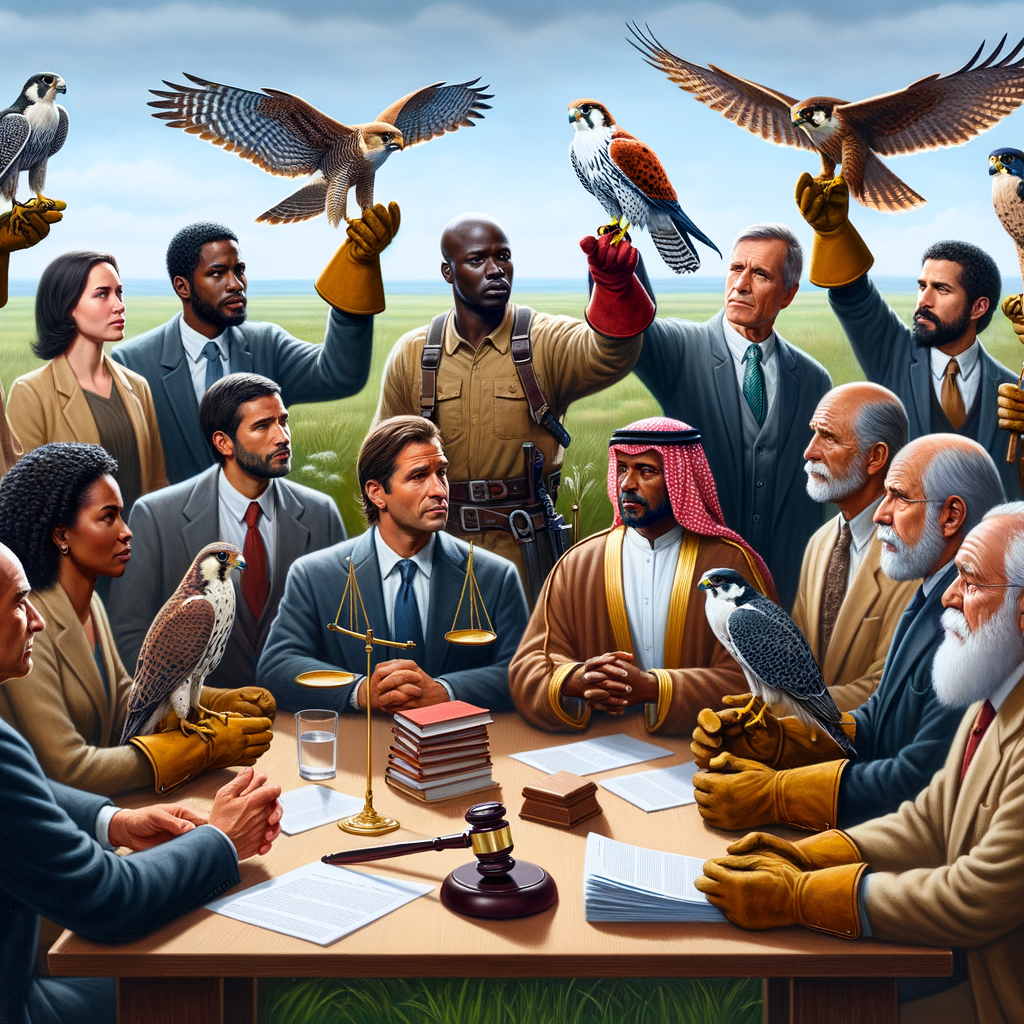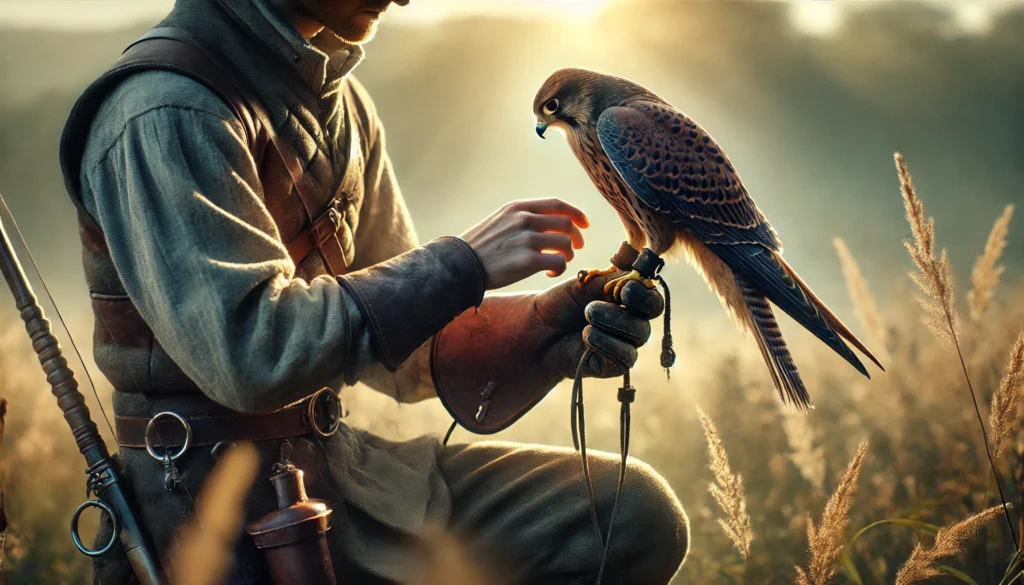Key Insights on Falconry Clubs and Legal Advocacy
- Support and Community: Falconry clubs offer a supportive community where members can share knowledge and experiences.
- Education and Training: Clubs provide education and training to help both novice and seasoned falconers enhance their skills.
- Legal Guidance: Members can receive advice and updates on legal matters affecting falconry.
- Conservation Efforts: Falconry clubs often participate in conservation efforts to protect raptor species and their habitats.
- Advocacy: Clubs play a crucial role in advocating for falconry rights and influencing legislation.
- Events and Competitions: Clubs organize events, competitions, and field meets to encourage engagement and showcase falconry talents.
- Mentorship: Clubs foster mentorship opportunities, pairing experienced falconers with newcomers to pass on traditional practices.
- Resource Sharing: Members have access to a wealth of resources, including care tips, hunting techniques, and equipment recommendations.
- Social Connection: Clubs offer a social platform for individuals passionate about falconry to connect and collaborate.
Why Falconry Clubs and Legal Advocacy Matter More Than You Think
Imagine you’re roaming the lush green hills of Ireland with a falcon perched gracefully on your arm. Just like the traditional Irish clans who worked together to protect their lands and traditions, falconry clubs play a crucial role in safeguarding our beloved sport and its ancient customs.
Here at Learn Falconry, we’re not just passionate about hunting with birds of prey; we’re also committed to preserving this age-old practice for future generations. In this article, we’ll delve deep into how falconry clubs work tirelessly to defend our rights and promote responsible falconry’just as the Irish clans used to stand up for what they believed in.
So, why should you keep reading? Well, understanding the importance of legal advocacy in falconry isn’t just for the experts’it’s for anyone who loves and respects these magnificent birds and the traditions they represent. You’ll learn how these clubs are not only about camaraderie and skill-sharing but also about navigating the often complex legal landscape to ensure that our feathered friends and our cherished culture of falconry remain protected.
Stay with us as we explore the vital role these clubs play and why their work is more important now than ever.
Falconry Clubs and Legal Advocacy: Protecting the Tradition
Falconry is an exciting sport that has been around for thousands of years and involves training birds of prey, like falcons, to hunt wild game. But did you know that falconry clubs play a crucial role in supporting enthusiasts and protecting the sport? In this article, we’ll explore what falconry clubs are, the importance of legal advocacy in falconry, and how falconry laws help conserve both the sport and the birds.
What are Falconry Clubs?
Falconry clubs are organizations where people who love falconry can meet, share knowledge, and support one another. These clubs are spread worldwide and offer various activities like workshops, hunting trips, and competitions. Members of falconry clubs often help each other with training falcons, acquiring the necessary equipment, and understanding complex falconry techniques. If you’re new to falconry, joining a falconry club can be a great way to start. Learn more about joining a club here.
Legal Advocacy for Falconry
The practice of falconry is highly regulated to ensure the safety and wellbeing of the birds and to protect wildlife. This is where legal advocacy in falconry comes in. Legal advocates work to make sure that laws supporting falconry are fair and effective. They help fight for the rights of falconers, promote ethical practices, and push for policies that aid in the conservation of birds of prey.
Understanding the legal aspects of falconry can be tricky, which is why clubs and organizations often provide resources to help their members navigate these laws. For instance, this guide on falconry laws and regulations provides detailed information on licensing requirements, falconry permits, and international regulations.
The Role of Falconry Organizations in Laws and Conservation
Falconry organizations play a critical role in shaping laws and regulations related to falconry. They work closely with governments and other conservation groups to make sure that the rules protect both the falconers and the birds. These organizations also advocate for the sustainability and ethical practice of falconry, ensuring that the sport is conducted responsibly.
For instance, conservation laws are often influenced by the work done by falconry clubs and organizations. They promote the idea that falconry should not harm the environment or the species involved. Falconry clubs also participate in conservation efforts such as breeding programs and the reintroduction of falcons into the wild. You can read more about these conservation efforts here.
Importance of Staying Informed
For falconers, staying up-to-date with the latest laws and regulations is crucial. These laws can vary significantly from one country to another, and even from one state to another within the same country. Falconry clubs often provide updates and training sessions to help members stay informed about these important changes. For starters, you can check out this section on state and federal laws.
In conclusion, falconry clubs and legal advocacy are paramount in preserving this ancient sport. By joining a club, you not only gain access to a wealth of knowledge and resources but also become part of a community dedicated to protecting and advancing the practice of falconry. Whether you’re a beginner or an experienced falconer, there’s always something new to learn and share.
Remember to keep exploring and learning about this fascinating practice by visiting our other articles on falconry clubs and legal aspects of falconry.
Falconry Clubs, Legal Advocacy, and Regulations in 2024
Membership and Important Dates
NAFA Membership
If you are interested in becoming a member of the North American Falconers Association (NAFA), it’s crucial to contact the NAFA Membership Secretary for any membership-related questions or inquiries.
Utah Falconry 2024
- Application Period: From February 1 to March 31, 2024.
- Available Permits: 17 peregrine falconry take permits (16 for Utah residents and 1 for nonresidents).
New York State Falconry
- Falconry Database Downtime: From August 1 to 3, 2023, for updates.
- Examination Registration Deadline: April 10, 2024.
- Falconry Examination Date: April 12, 2024.
- License Expiration: Licenses expire on December 31 every 5th year after issuance. Renewal forms are mailed prior to expiration.
Legal Advocacy for Falconry
License Renewal
- Falconry licenses expire on December 31 every 5th year.
- Renewal forms will be sent by mail before the expiration date. Contact the DEC Special Licenses Unit if forms aren’t received 2 weeks prior.
Annual Reporting
- Falconers must complete the Falconry Annual Report Form by December 31 each year. This requirement applies to all licensed falconers.
Falconry Examination
- To become a falconer, you must pass the falconry examination with at least an 80% score.
- Registration Deadline: April 10, 2024.
- Exam Date: April 12, 2024, between 7 a.m. and 11 p.m., with a 2-hour time limit.
General and Master Falconer Licenses
General Falconer
- Age Requirement: Must be 18 years or older.
- Training: 4 months of annual training and hunting with raptors as an apprentice.
Master Falconer
- Experience: 3 years of annual training and hunting with raptors as a general falconer.
- Additional Requirement: Submit a written summary of your experience and get recommendations from sponsors and other master falconers.
Federal and State Regulations
Federal Regulations
- The U.S. Fish and Wildlife Service (USFWS) has reorganized the regulations, transferring all falconry permitting to states while retaining law enforcement authority.
State Regulations
- Utah: Requires indoor or outdoor facilities for falconry birds, inspected by the Division.
- Minnesota: Falconry permits are valid for three years and expire on September 30 of the 3rd year. Renewal costs $100, payable to the U.S. Fish and Wildlife Service.
| State | Permit Validity | Fee |
|---|---|---|
| Utah | Specific Permit Dates | Requires Indoor/Outdoor Mews |
| Minnesota | 3 Years | $100 |
Falconry Seasons and Event Regulations
Hunting Seasons 2024
- Dove: November 17 – December 3, 2023.
- Duck: January 29 – February 12, 2024.
- Rails, Gallinules, and Moorhens: January 29 – February 12, 2024.
- Woodcock: January 29 – February 12, 2024.
| Season | Start Date | End Date |
|---|---|---|
| Dove | Nov 17, 2023 | Dec 3, 2023 |
| Duck | Jan 29, 2024 | Feb 12, 2024 |
| Rails | Jan 29, 2024 | Feb 12, 2024 |
| Woodcock | Jan 29, 2024 | Feb 12, 2024 |
Legal Penalties and Inspections
- Violations of state migratory game bird regulations can lead to criminal penalties, civil restitution fees, and license suspension or revocation.
- Falconers may face warrantless inspections by armed officers. Refusing these can result in license revocation and confiscation of birds.
Advocacy and Support
Advocacy Organizations
- Falconry Fund: Supports falconers with legal and policy issues to ensure access to wildlife resources and habitats.
- International Association for Falconry (IAF): Promotes the sustainable use of wildlife and conservation of raptors and their prey.
Falconry Events
- IAF AGM ‘ NAFA Meet: Scheduled for November 2023.
- Texas Hawking Association: Various events, including a family picnic in September 2024.
By staying informed about membership, licensing, legal requirements, and advocacy support, falconers can navigate the complex world of falconry with confidence.
Key Takeaways from Falconry Clubs and Legal Advocacy
In our journey through falconry clubs and legal advocacy, we’ve highlighted key points that every aspiring and current falconer should know. We’ve discussed critical membership and regulations updates, such as the NAFA membership process, annual permit deadlines, and essential dates for the falconry examination. These timelines and requirements ensure that falconry practitioners are always up to date and compliant with legal standards.
Moreover, we reviewed the importance of adhering to federal and state regulations, including license renewal processes, annual reporting, and passing necessary examinations with a specified score. These steps are crucial for maintaining one’s status as a licensed falconer and for contributing to the responsible and ethical practice of falconry.
We also delved into the diverse state-specific requirements. For instance, Utah requires specific indoor and outdoor housing for falcons, while Minnesota mandates a permit renewal fee every three years. Understanding these regional laws helps falconers abide by unique regulations in different states.
Finally, organizations like the Falconry Fund and the International Association for Falconry play a vital role in legal advocacy. These organizations strive to protect the rights of falconers and promote the conservation of raptors and their habitats. From supporting legal issues to hosting events, these organizations foster a sense of community and collaboration among falconers worldwide.
With these insights, it’s evident how crucial it is to stay informed and engaged with both local and federal regulations, maintain proper documentation, and actively participate in falconry communities. This proactive approach ensures that you not only comply with the law but also contribute to the responsible and sustainable practice of this ancient art.



